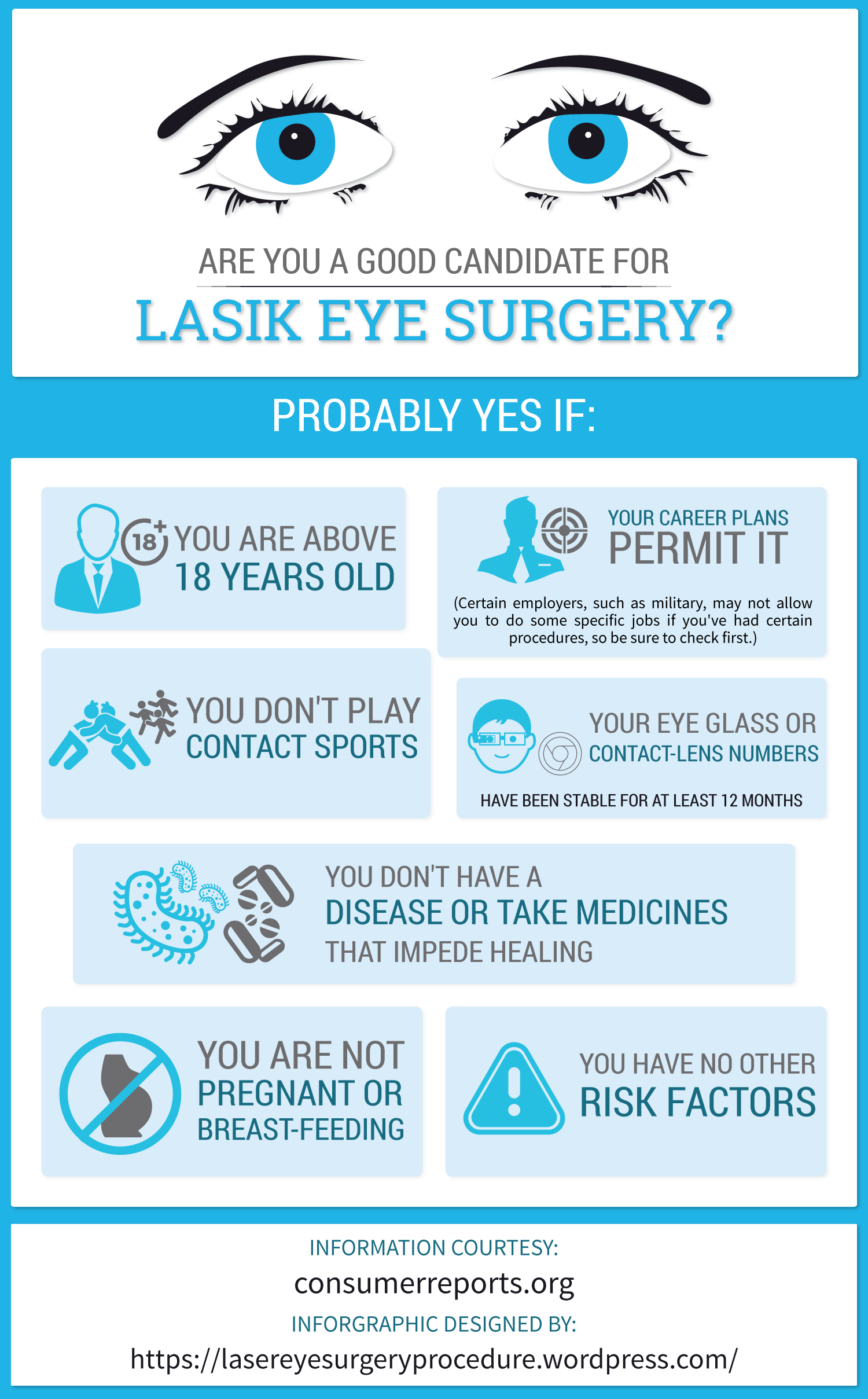Frequently Asked Questions Regarding Lasik Eye Surgical Procedure

Content author-Burt Crouch
Prior to LASIK, your eye doctor will check your vision to see to it it is steady. He or she will likewise examine to see if you have any other eye issues that might affect your outcomes.
After the eye doctor has used numbing eye declines, he or she will certainly develop a paper-thin flap in your cornea tissue making use of a gadget called a microkeratome or laser. The procedure is painless.
What Is LASIK?
LASIK is a kind of refractive surgical treatment. It remedies vision issues brought on by refractive mistakes, which take place when the cornea or lens don't appropriately bend light rays.
Many people who have LASIK accomplish great distance vision without glasses or get in touches with. Nonetheless, they may need reading glasses to see close up. The results of LASIK are irreversible, although visual side effects are short-term.
Can I Have LASIK if I Have Astigmatism?
Blurred vision is typically brought on by astigmatism. LASIK can help with this issue by making your cornea much more in proportion. The doctor will utilize a tool called a microkeratome or laser to cut a thin flap in your cornea, then fold it back. They will certainly after that utilize a laser to reshape the cornea so it can bend light better.
The only thing that LASIK can not do is appropriate presbyopia (age-related farsightedness). This can only be finished with cataract surgical procedure.
Can I Have LASIK if I Have Dry Eye?
An essential part of the LASIK evaluation is checking how well your eyes produce splits. Some individuals with completely dry eye are incapable to get LASIK due to the fact that it can get worse the condition.
Dry eye is a typical adverse effects of LASIK because the procedure severs corneal nerves. However, it normally improves as the eye heals. You can make use of man-made rips and also punctal plugs to handle your signs.
Can I Have LASIK if I Have a Cataract?
Most of the times, yes. click this link can boost your vision after cataract surgery.
When you have a cataract, your lens is over cast and your close-up vision is blurry. LASIK can help with this, in addition to your distance vision.
During https://telegra.ph/A-Comprehensive-Guide-To-Lasik-Eye-Surgical-Procedure-Costs-As-Well-As-Funding-Choices-05-31 , your specialist will make use of a laser or a blade to produce a thin flap on your cornea. Then the cosmetic surgeon will fold up the flap back and utilize a laser to reshape your cornea.
Can I Have LASIK if I Have a Retinal Detachment?
Retinal detachment normally results from a retinal tear. The doctor will certainly fix the tear with an in-office treatment called pneumatic retinopexy. After the eye is numbed, the doctor inserts an expanding gas bubble into the eye to push the removed retina against its assistance tissue.
LASIK does not proper presbyopia, which develops as you grow older as well as causes blurry close-up vision. Nevertheless, it can be combined with mono-vision to lower or eliminate the need for reviewing glasses.
Can I Have LASIK if I Have a Hyperopia (Farsightedness) or Myopia (Nearsightedness)?
The majority of medical insurance business do not cover LASIK due to the fact that it isn't taken into consideration clinically needed. Nonetheless, they might compensate patients for lens implants if a surgeon belongs to their network.
Before you undergo LASIK, your ophthalmologist will certainly perform a detailed eye exam. Replacement Surgery will consist of examining your total eye health and wellness, pupil dimension and also refractive mistake. He or she will certainly likewise measure the density of your corneas.
Can I Have LASIK if I Have Presbyopia (Aging Eyes)?
LASIK does not resolve presbyopia (loss of near vision connected with age). Rather, it remedies refractive errors by reshaping the cornea.
After numbing decreases and also covering the eye with a guard or spot, the specialist creates the flap. Then the laser improves the cornea. You may listen to a clicking sound as well as smell an unusual aroma. This is normal as well as does not cause injury.
Can I Have LASIK if I Have Keratoconus (Rounded Cornea)?
In LASIK, your specialist will make use of a femtosecond laser to reduce a thin flap in the cornea. They will then fold it back and make use of a different laser to reshape your cornea.
Your vision is based upon how light enters your eye, bends with the lens and concentrates on the retina. Refractive mistakes maintain light from focusing appropriately as well as trigger fuzzy vision.
Can I Have LASIK if I Have Blepharitis (Swelling of the Eyelids)?
Many individuals choose LASIK because they desire freedom from glasses or get in touch with lenses. It is essential to discuss your objectives with your ophthalmologist prior to having the procedure.
LASIK is not painful. Eye drops are positioned to numb your eyes before the surgical procedure. Many patients explain feeling a small stress but no pain. Healing from LASIK is fairly fast. Your vision will be a little blurry as well as light sensitive right after surgery however must boost quickly.
Can I Have LASIK if I Have a Corneal Thickness Issue?
LASIK corrects vision by reshaping the corneal cells. To do this, the cornea must be thick enough for the cosmetic surgeon to develop a flap.
If your corneas are also thin, you might be a candidate for laser vision improvement procedures that do not call for creating a flap, such as PRK or Epi-LASIK. These treatments have similar results to LASIK yet work in a various way.

